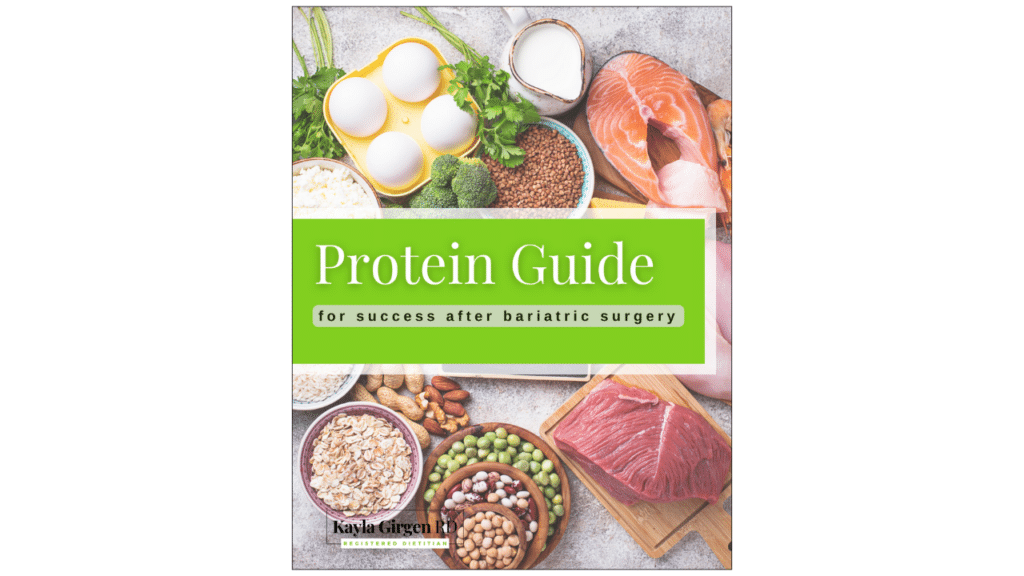Last Updated on April 16, 2024 by Kayla
If you’re wrestling with a weight loss stall or weight gain after bariatric surgery, you’re not alone, and your journey doesn’t stop here. The good news is you don’t have to resort to calorie counting or pouch resets to restart weight loss after gastric sleeve.
You invested a lot of time, energy, and finances into your bariatric journey. You might feel pressure to “perform” for yourself and your loved ones. It’s frustrating to be successful in your work and home lives yet struggle with your weight.

Feelings of shame and defeat might prevent you from seeking help. This post will help identify what eating patterns or emotional stressors are keeping you from the success you deserve.
Myths & Expectations After Bariatric Surgery
Everyone faces a unique set of challenges, making your journey just that—yours.
It’s hard not to compare yourself to others who’ve had the same procedure or started around the same weight. Many factors outside of eating influence weight loss: age, genetics, medications, fitness level, stress, environment, and so much more.
On top of that, there is no shortage of conflicting advice and unrealistic expectations.
As a Bariatric Dietitian, I see my clients struggle with false beliefs and impossible timelines for losing weight. For example, you might feel pressure to lose 100 pounds, reach “Onederland,” or lose ‘X’ amount the first year following surgery.
You don’t magically stop losing weight after one year post-op. You can also lose weight without counting calories and still enjoy your favorite foods. Eating 100 percent perfect isn’t necessary for success, so don’t feel discouraged if there are habits you could improve on. Self-awareness is the first step to making changes.
If you’re discouraged and feel like you’re starting over—again—think of it this way: You’re starting over, but this time with more information. You know more now than you did before.
As tempting as it is to see results fast, please don’t opt for a pouch reset diet to restart weight loss after gastric sleeve surgery. A pouch reset diet is a liquid diet similar to the one you follow immediately post-op. It is highly restrictive, induces bingeing behaviors, and does not “shrink” your pouch.
Chronic yo-yo dieting, including pouch resets, can lead to muscle loss followed by weight regain, mainly consisting of fat. This combination, repeated over time, wreaks havoc on your body composition and metabolism. This is why finding sustainable solutions to get back on track after gastric sleeve surgery is paramount to your success.
The Best Way to Restart Weight Loss After Gastric Sleeve
Compared to other dietitians or bariatric nutritionists, my approach to weight loss after gastric sleeve and gastric bypass is different. I don’t believe in meal plans; however, I do believe in having a plan.
Meal plans and calorie targets are short-term fixes, but long-term, they fail to teach you how to live—and eat— for real life. You didn’t have bariatric surgery to diet for the rest of your life.
My whole-life perspective on weight loss pivots around managing your blood sugar, so you feel fabulous from the inside out. When you’re not fixated on food or rebounding from blood sugar highs and lows, you’ll have more energy, fewer cravings, and be able to make informed, deliberate food choices, ultimately impacting your weight loss results.

When you focus on the “big picture,” weight loss becomes a byproduct of your hard work. If you want a new way to approach weight loss and reset your mind and metabolism, keep reading to learn my top three secrets to restart weight loss after gastric sleeve surgery!
Reset Secret #1: Stop Snacking
Eating small, frequent meals immediately post-op after gastric sleeve or gastric bypass surgery is necessary to meet protein requirements. However, it is not recommended to continue this pattern long-term.
Grazing, or continuous snacking throughout the day, is the number one reason for weight regain after gastric sleeve. Eating small, frequent meals is the gateway to grazing and weight gain.
When you’re constantly eating, your blood sugar jumps up and down, leading to energy crashes and hunger shortly after eating. You can see this eat-crash-eat-repeat cycle in the top glucose timeline illustrated below.

On the bottom timeline, you can see how fewer snacks led to more stable blood sugar. It’s important to note that what foods you eat also makes a difference.
This example is from a client who was three years post-op VSG and struggling with weight loss stalls. By monitoring her blood sugar levels, we could identify how small, frequent meals created more “spikes,” increasing her hunger and appetite.
With a few tweaks, we found balanced meals to keep her satisfied longer. The scale started moving again, and she was able to lose weight using CGM.
To learn more about how specific foods and meal patterns, like grazing, impact your blood sugar, apply now for more information about bariatric coaching with CGM.
Grazing isn’t an easy habit to kick. You’ll have to explore whether you’re snacking out of habit or hunger. It takes practice and patience to distinguish physical hunger from emotional hunger, so don’t expect to kick your grazing habit overnight. Remember, you had surgery on your stomach, not your head!
Reset Secret #2: Eat More Protein
Eating more protein isn’t new news, and 60 grams of protein—the amount recommended by many bariatric surgery centers—isn’t nearly enough to sustain your body’s needs.
Sixty grams of protein is an excellent first goal following surgery. However, as you get further out, your protein target should increase to 80 grams and, eventually, 100 grams daily. I recommend 80 to 100 grams of protein per day for all my clients, whether or not they are physically active.
If you’re working out hard or trying to build muscle, your protein needs may be even higher. A good rule of thumb is to take your goal weight in pounds and multiply it by 0.75 to get your daily protein goal in grams.
For example, if your goal weight (not current weight) is 180 pounds:
180 x 0.75 = 135 grams protein
I like introducing flexibility to this target by aiming for a range of +/- 10 to 20 grams. This example translates to a goal range of 115 to 155 grams, or an average of 135 grams of protein daily.
Depending on your current protein intake, reaching numbers like this may feel intimidating. Meet yourself where you’re at and try to increase by 10 to 30 grams of protein per week, and you’ll surely kick start your weight loss after gastric sleeve surgery.
Check out my recipes page for high-protein meal and snack ideas. You can also download my protein guide to help meet your protein goals after bariatric surgery for FREE!
Last but not least, let’s examine one of the most overlooked reasons for weight loss stalls or regain after gastric sleeve: poor stress management.
Reset Secret #3: Stress Less
Stress is a silent killer of weight loss results. If you’re “doing all the things” yet struggle to restart weight loss after gastric sleeve, stress might be sabotaging your success.
When your body is under stress, a hormone called cortisol is released. Cortisol elevates blood sugar to fuel your body and help overcome immediate stressors; it’s a survival mechanism.
For example, our ancestors needed extra glucose to fuel their muscles while hunting and gathering food. These bouts of stress were usually short-term.
Nowadays, mental stress is more common than physical stressors experienced centuries or even decades ago. Whether stress is psychological or physical, your body responds the same way: It releases cortisol, which increases blood sugar.
Below is another client example using CGM. She is one year post-op and a registered nurse. During a difficult patient encounter, you can see how stress raised her blood sugar more than the snack beforehand and meal afterward!

I see this pattern often with my female clients working in helping professions:
- nurses assisting sick patients
- teachers managing challenging students
- hairdressers working with picky clients
- therapists counseling difficult patients
- executives negotiating with their teams
With CGM, you can’t hide from stress, and you’re able to “see” how stress affects your health.
In addition to blood sugar imbalance, chronic stress promotes muscle breakdown and fat storage—a double whammy on body composition. Poor stress management also leads to diminishing returns if you work out too much and don’t plan for adequate recovery.
Stress triggers emotional eating and negatively impacts sleep, both of which exacerbate blood sugar imbalance and feed a vicious cycle of eating for mental and physical comfort.
While stress is a natural part of life, you have to learn to cope with stress in healthy ways that don’t involve soothing with food, booze, or other unhealthy habits.
Summary
If you’re looking to restart weight loss after gastric sleeve surgery, skip pouch resets, calorie counting, and restrictive diets which fuel all-or-nothing thinking. These tactics might work in the short term, but in the long term, they fail.
Instead of resorting to old weight loss tactics, reset your post-op journey and get back on track with a different approach—balancing your blood sugar.
First, reign in your snacking habit and determine whether you’re eating out of hunger or habit. Remember, grazing is the number one reason for weight regain after gastric sleeve surgery.
Next, reassess your protein intake. What your surgery center recommended might not be enough. Follow my recommendations of 60, 80, and then 100 grams of protein daily to help kickstart your weight loss after VSG or RNY.
Third, keep your stress in check. If you feel like you’re doing everything right, yet the scale isn’t moving, stress could be the culprit. Avoid self-sabotage by finding healthy ways to cope with stress that don’t involve food.
Lastly, if you’re looking for fast results, insightful data, and accountability to restart your weight loss after bariatric surgery, apply today to learn more about my 6-month coaching program with CGM.
Stop dieting and start doing things differently. You didn’t have weight loss surgery to count calories or painstakingly monitor each morsel of food that enters your mouth.
Learn how to get the results you deserve without giving up the foods you love. You shouldn’t have to eat “perfect” to see results. I can show you how. To see if we’re a good fit, read more on my About page.
Otherwise, I hope these gastric sleeve reset secrets help get you and the scale moving again! For more dietitian-approved weight loss tips, be sure to follow me on Instagram.
Ta ta for now! 👋
Yours truly,
Helping women after bariatric surgery lose weight without eating “perfect.” Learn how to balance blood sugar & optimize your “tool” today! Apply to learn more!
This post may contain affiliate links. When you make a purchase through any of the links, there is no additional cost to you, and I may earn a small (and very appreciated) commission. Thank you for your support!



